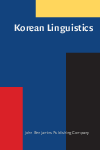
Korean Linguistics
Scope & Guideline
Innovating Perspectives on Korean Linguistic Studies
Introduction
Aims and Scopes
- Sociolinguistic Studies:
Explores the dynamics of language use within different Korean-speaking communities, addressing issues such as language maintenance, shift, and identity. - Language Acquisition and Education:
Investigates the processes involved in learning Korean as a first or second language, focusing on educational practices, parental perceptions, and heritage language education. - Corpus-based Research:
Utilizes empirical data from corpora to analyze various aspects of the Korean language, including verb conjugation, honorifics, and child language development. - Pragmatics and Discourse Analysis:
Examines how context influences language use, including the functions of discourse markers and the pragmatics of communication in Korean. - Phonetics and Phonology:
Focuses on the sound system of Korean, studying phonetic contrasts, prosody, and the perception of phonological elements. - Morphosyntactic Investigations:
Analyzes the structure of the Korean language, including the role of morphemes and syntactic constructions in communication.
Trending and Emerging
- Heritage Language Maintenance:
A significant increase in research focusing on the maintenance and education of heritage languages within Korean communities abroad underscores the importance of cultural identity and language preservation. - Language and Identity:
Emerging studies are increasingly examining the interplay between language use and personal or community identity, especially in multicultural contexts, highlighting how language shapes social dynamics. - Interdisciplinary Approaches:
There is a trend towards integrating methodologies from fields such as psychology, education, and communication studies, allowing for a more holistic understanding of language acquisition and use. - Pragmatic Competence in Language Learning:
Research focusing on pragmatic aspects of language learning is gaining traction, emphasizing the importance of context and social norms in acquiring communicative competence. - Technology in Language Education:
The use of technology, including corpus analysis and automated tools for language learning, is becoming a significant area of interest, reflecting broader trends in educational practices.
Declining or Waning
- Traditional Syntax Studies:
Research focusing solely on traditional syntactic structures in isolation has become less prevalent, as contemporary studies increasingly integrate sociolinguistic and pragmatic perspectives. - Descriptive Studies of Dialects:
Papers concentrating exclusively on regional dialects of Korean have diminished, possibly due to a shift toward more global perspectives on language use and variation. - Historical Linguistics:
There has been a noticeable reduction in studies examining the historical development of the Korean language, as current research trends favor contemporary sociolinguistic issues.
Similar Journals

Language and Linguistics Compass
Showcasing Innovative Insights in LinguisticsLanguage and Linguistics Compass, published by Wiley, stands as a premier journal in the field of linguistics, showcasing innovative and interdisciplinary research. With its ISSN 1749-818X and E-ISSN matching, the journal has built a robust reputation, achieving an impressive Q1 ranking within the linguistics category for 2023, placing it in the top 4% of its field. Its Scopus rank of 48 out of 1167 highlights its influence and significance among linguistics journals, boasting a commendable 95th percentile. This journal serves as a vital resource for researchers, professionals, and students, offering a wide range of accessible articles that illuminate current trends and advances within the domain of language studies. Although it is not Open Access, the journal is committed to quality and diversity in its publications, ensuring scholarly articles from various sub-disciplines of linguistics are represented from 2008 through 2024. Located in the United Kingdom, Language and Linguistics Compass invites contributions from around the globe, reinforcing its status as a leading forum for linguistic discourse.
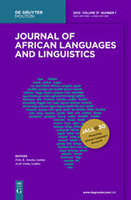
Journal of African Languages and Linguistics
Elevating Scholarship in African LanguagesThe Journal of African Languages and Linguistics, published by DE GRUYTER MOUTON, is a premier academic journal dedicated to the study and analysis of the diverse languages spoken across Africa. With an ISSN of 0167-6164 and an E-ISSN of 1613-3811, this journal has been pivotal since its inception in 1979, engaging readers with rigorous research and scholarly articles that span across critical themes in linguistics and language studies. Based in Germany, the journal holds a distinguished Q2 category ranking in the field of Linguistics and Language, according to the latest 2023 metrics, and features a commendable Scopus ranking, positioning it well within the 56th and 52nd percentiles in its respective categories. Although it currently does not provide open access, it is an essential resource for researchers, professionals, and students alike, striving to deepen their understanding of African languages, their structures, and their sociocultural contexts. With a continuously expanding scope and a commitment to advancing linguistic scholarship, the journal remains a significant platform for fostering academic dialogue and promoting innovative research in African linguistics.

Glossa-A Journal of General Linguistics
Advancing Open Access in Language ResearchGlossa: A Journal of General Linguistics, published by the Open Library of Humanities, stands as a leading voice in the realm of linguistic research since its inception in 2016. With its Q1 category ranking in Linguistics and Language and impressive Scopus ranks encompassing the top 83rd and 81st percentiles in its respective fields, Glossa fosters a vibrant academic community committed to the rigorous exploration of language and linguistic theory. Operating under an open access model, the journal not only enhances the visibility of groundbreaking research but also ensures that valuable insights are accessible to a global audience. The journal's commitment to interdisciplinary dialogue makes it an indispensable resource for scholars, professionals, and students eager to engage with contemporary developments in linguistics. As it converges into 2024, Glossa continues to champion innovative scholarship and critical discourse that challenges conventional boundaries within the field.

Annual Review of Linguistics
Empowering Researchers with Rigorous ReviewsAnnual Review of Linguistics is a premier scholarly journal dedicated to advancing the field of linguistics through comprehensive and insightful reviews of current research and emerging trends. Published by ANNUAL REVIEWS, this journal is recognized for its high impact, evidenced by its Q1 ranking in the Linguistics and Language category and exceptional placements in the Scopus Ranks, positioning it in the top 2% of its field. Since its inception in 2015, the journal has served as a vital resource for researchers, professionals, and students seeking to deepen their understanding of language theories, acquisition, processing, and sociolinguistics. With no Open Access currently available, the Annual Review of Linguistics is esteemed for its rigorous peer-reviewed articles that synthesize a wealth of knowledge, making it an indispensable tool for advancing research and dialogue within the linguistic community.
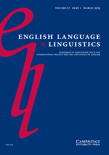
English Language & Linguistics
Pioneering Research in English LinguisticsEnglish Language & Linguistics is a prestigious journal published by Cambridge University Press, specializing in the dynamic fields of linguistics and language studies. With an impressive Q1 ranking in both Linguistics and Language categories for 2023 and a notable placement in the Scopus metrics, where it ranks #142 out of 1088 in Arts and Humanities, the journal is recognized for its high-quality research contributions and robust impact in the scholarly community. Since its inception in 1997, English Language & Linguistics has provided a forum for researchers to explore various aspects of language, facilitating the dissemination of innovative ideas and empirical studies. With no open access options currently available, the journal remains a valuable resource within the United Kingdom and beyond, fostering a deeper understanding of language intricacies and their broader societal implications. For practitioners and academicians alike, this journal is a critical resource for keeping abreast of the latest advancements in linguistics.
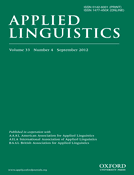
APPLIED LINGUISTICS
Bridging Theory and Practice in Language StudiesApplied Linguistics, published by Oxford University Press, is a premier scholarly journal that has significantly contributed to the fields of linguistics and communication since its inception in 1980. With an impressive impact factor and ranked in the top quartile (Q1) in both Communication and Linguistics and Language categories, Applied Linguistics is recognized for its rigorous peer-reviewed articles that explore the intersections of language, society, and cognition. The journal enjoys a remarkable position in the Scopus rankings, placing it among the top 2% of publications in its discipline. Researchers, professionals, and students benefit from its comprehensive scope, which encompasses innovative research on language acquisition, discourse analysis, and applied linguistics methodologies. Although not an open access journal, its commitment to advancing knowledge and fostering academic discussions makes it an indispensable resource for anyone interested in the critical role of language in various contexts.
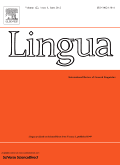
LINGUA
Exploring the depths of language and communication.LINGUA is a premier academic journal dedicated to the field of linguistics, published by ELSEVIER and based in the Netherlands. With an ISSN of 0024-3841 and an E-ISSN of 1872-6135, this esteemed journal has garnered a reputation for excellence, evidenced by its position in the top Q1 quartile in Linguistics and Language as of 2023. LINGUA serves as a vital platform for scholars, researchers, and students, showcasing innovative research and critical discussions across various linguistic subfields. The journal has demonstrated impressive Scopus rankings—151 out of 1088 for Language and Linguistics, and 176 out of 1167 in Social Sciences—placing it in the 86th and 84th percentiles, respectively. By providing a forum for the dissemination of advanced linguistic theories and their applications, LINGUA continues to significantly contribute to the academic community, making it an essential resource for anyone engaged in the study of language.

Journal of the International Network for Korean Language and Culture
Fostering Interdisciplinary Dialogue on Korean HeritageJournal of the International Network for Korean Language and Culture is a prestigious academic journal dedicated to the study and dissemination of research pertaining to the Korean language and its rich cultural heritage. Published by the International Network for Korean Language and Culture, this journal serves as a vital platform for scholars, educators, and practitioners in the fields of linguistics, cultural studies, and education. As an open-access publication, it aims to make research widely accessible, fostering an environment of knowledge sharing and interdisciplinary collaboration. The journal features high-quality articles that contribute to our understanding of the linguistic intricacies and cultural nuances of Korea, and it is committed to advancing scholarly dialogue and exploration within this vibrant field. By highlighting current trends and advancements, the Journal of the International Network for Korean Language and Culture stands out as an essential resource for those engaged in the pursuit of knowledge about Korean language and culture.

Revista Virtual de Estudos da Linguagem-ReVEL
Unveiling Innovative Perspectives on LinguisticsRevista Virtual de Estudos da Linguagem-ReVEL is a prominent academic journal dedicated to the field of linguistics, published by REVISTA VIRTUAL ESTUDOS LINGUAGEM in Brazil. With its ISSN 1678-8931, ReVEL aims to provide a platform for scholarly communication and dissemination of research across diverse areas of language studies, including sociolinguistics, language acquisition, and discourse analysis. As an open-access journal, it fosters accessibility to important linguistic research, allowing researchers, educators, and students alike to engage with the latest findings without subscription barriers. The journal’s focus on innovative methodologies and interdisciplinary approaches makes it a valuable resource for those seeking to deepen their understanding of language dynamics in various contexts. By contributing to the growing body of knowledge in this field, ReVEL plays a crucial role in promoting scholarly dialogue and enhancing the visibility of Brazilian linguistic research on a global scale.

Rasprave
Advancing linguistic knowledge through open dialogue.Rasprave is a distinguished open access journal published by the Institute of Croatian Language and Linguistics in Croatia, dedicated to advancing the field of linguistics and language studies. With an ISSN of 1331-6745 and E-ISSN 1849-0379, the journal has embraced open access since 2007, making its research widely available to scholars globally. It holds an important position in the academic community, particularly noted for its 2023 Scopus ranking within the Arts and Humanities and Social Sciences categories, falling into the 59th and 56th percentiles respectively. The journal’s impact is further reflected in its Q3 quartile ranking in linguistic and language studies, showcasing its relevance and growing influence in this vibrant field. Rasprave aims to publish innovative research that deepens understanding of language dynamics, linguistic theory, and sociolinguistics, making it an essential resource for researchers, professionals, and students seeking to enrich their knowledge and contribute to the academic discourse surrounding language.